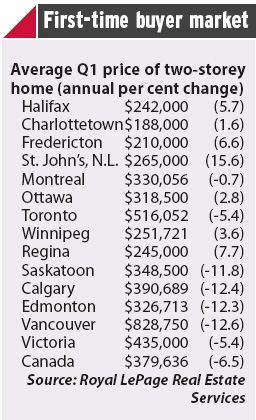Some declines have hit 17 per cent, but Victoria is bucking the trend
Elaine O’Connor
Province

Vancouver‘s real-estate market continues to dive, with year-over-year price declines of as much as 17 per cent in some sectors, according to Royal LePage’s latest quarterly report.
Prices are depressed across the region, with the average price in Vancouver‘s west and east sides, North and West Vancouver down 12 per cent from this time last year, according to statistics in Royal LePage’s latest house-price survey.
The pain is being felt the hardest among the high-end properties in West Vancouver, where tony homes are no longer fetching top dollar.
Prices there are down an average of 16.3 per cent in one year.
Broken down into house categories, average West Vancouver two-storey houses fell 17 per cent to $930,000, bungalows were down 16.2 per cent to $880,000, and condos fell 15.8 per cent to $400,000.
Across Canada, prices are down, during the year’s first quarter. The average price of a two-storey home during 2009’s first three months was $379,636, down 6.5 per cent from a year earlier. The average condo price was down 3.4 per cent to $232,877.
Royal LePage North Shore president Bill Binnie says there’s an upside: the down market can offer opportunities for first-time and move-up buyers.
“The activity we’re seeing now is as a result of first-time buyers who have not been able to get into the market because of the high prices and lack of inventory. Now prices have rolled back two years and interest rates, we have never seen them at this rate before. So they are seeing this as an opportunity.” For move-up buyers, Binnie said, “the high-priced houses have come off a little more in price than the lower-priced ones, so if you are moving up the differential is smaller, and the financing cost is a lot less.” Across Vancouver, price declines were pronounced.
In North Vancouver, year-over-year house prices are down an average of 14.2 per cent, compared to the first quarter of 2008. Royal LePage points out the rate of decline has slowed somewhat in North Vancouver, with prices not falling as much this quarter as last.
North Vancouver two-storey homes lost 14.3 per cent to an average of $660,000, bungalows fell 14.8 per cent to $605,000 and condos dropped 13.4 per cent to $290,000 compared to this time last year.
In Vancouver West, two-storey houses have dropped 9.8 per cent over last year to $1.15 million, bungalows declined 9.5 per cent to $950,000 and condominiums are going for 7.4 per cent off for an average of $640,000 in 2009.
In Vancouver East, two-storey homes fell 8.7 per cent to $575,000, bungalows dropped 10.1 per cent to 540,000 and condos lost eight per cent and are selling for an average of $311,000 this quarter.
As prices fall, buyers can lose any sense of urgency, as they wait for them to fall further.
Royal LePage Westside real-estate specialist David Scarr says the last quarter of 2008 was among the worst he’s ever seen, with some home prices in Dunbar and Point Grey off 30 per cent.
“The last quarter was almost a write-off, probably the slowest I’ve seen in the last 24 years,” Scarr said, adding while the local market will remain sensitive to global economic factors, he’s optimistic the rest of 2009 won’t be as brutal.
Scarr says buyers “don’t have to compromise now. Now you can be a bit more patient,” but adds there’s been an uptick in entry-level sales activity in February and March, indicating more competition.
Scarr’s advice for sellers? “You’ve got to be realistic about your asking price. You have to look at what has sold. And you have to show your property in the absolute best light.” The bright spot for B.C. sellers at the moment is in Victoria, where some sale prices are up in the first quarter of 2009 compared to 2008.
Broken down by house type, Victoria two-storey house prices have dropped just 5.4 per cent to $435,000, bungalow prices have risen annually by 3.2 per cent to $453,000 and condo prices fell 11.6 per cent to 260,000.
The Royal LePage survey studies seven types of housing in 250 neighbourhoods in Canada.
© Copyright (c) The Province

